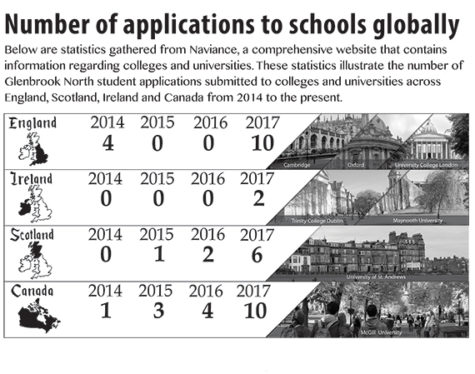Students say ‘yes’ to college abroad
 As she prepares to pursue her bachelor’s degree in Israel, senior Sweetlana Portnaya jokingly said she is looking forward to more than just the warm weather and “attractive Israeli jawlines.”
As she prepares to pursue her bachelor’s degree in Israel, senior Sweetlana Portnaya jokingly said she is looking forward to more than just the warm weather and “attractive Israeli jawlines.”
“I’m [excited for] the diversity in an international school because, with diversity, you can expand your way of seeing the world,” Portnaya said.
Beginning in the fall of 2017, Portnaya plans to attend the Interdisciplinary Center Herzliya, an Israeli university, as a communications major with a focus in media.
According to the Institute of International Education, also known as the IIE, recent data reveal that at least 48,000 U.S. students were pursuing their full degrees abroad during the 2015-2016 school year, and this number has risen continuously with an estimated 8.2 percent total increase over the past five years.
Sharon Witherell, director of public affairs at the IIE, said in a phone interview that 48,000 students is an undercount because the IIE must rely on international institutions and organizations to report the data.
“We have seen continual increases in American students studying abroad.
“I think that students and parents and educators are all realizing that it is very important to have international experiences and gain a global perspective,” Witherell said.
Jocelyne Younan, associate registrar in undergraduate recruitment and communication at the University of McGill in Canada, said in a phone interview that the university currently has 1,803 undergraduate students from the United States and 10,244 international students on campus, which constitute 26 percent of the undergraduate population. The University of McGill saw a striking 21 percent increase in applicants from the United States during the 2016-2017 application season.
“[I think] some of the world events that are taking place right now … have driven application numbers up, not just from the U.S., but also internationally,” Younan said.
According to Portnaya, she is eager to immerse herself in her new, international surroundings.
“The most important part of going abroad is to be open to new experiences,” Portnaya said.
Senior Kaitlin Jaffe said she is looking forward to learning about new cultures as she begins studying biomedical engineering at the University of Victoria in Canada this fall.
“Whether people decide to stay [in America] or not, it’s their choice, but ever since I was little, I just wanted to see the world,” she said.
Jaffe said she is also pleased that the tuition costs at the University of Victoria are cheaper than tuition costs at many U.S. schools.
According to David Boyle, coordinator of college counseling, tuition at international schools may be cheaper than U.S. schools, but these costs depend on the schools and currency exchange rates.
For example, the annual cost of tuition at the University of St. Andrews in Scotland is £20,570, which is currently $26,700, as opposed to the $34,246 tuition cost for out-of-state students at Indiana University Bloomington to which 151 Glenbrook North students applied this past year.
Beth Shotton, director of international admissions at the University of St. Andrews, said in a phone interview that another benefit for students who choose to pursue an education in the United Kingdom is that there are no general education requirements while many U.S. schools have these requirements.
“It’s not about bagging lots of different credits,” said Shotton. “It’s about taking a focused pathway, and I think that’s what makes Scotland so unique and … appealing to a lot of our U.S. students.”
In a phone interview, alumna Jessica Steinberg (‘13), who is now a fourth-year student at the University of St. Andrews, said she values the flexibility of the Scottish education system. Additionally, she has appreciated having the opportunity to travel to nearby European countries and to study abroad in China.
Steinberg said that she has also enjoyed adapting to a new environment while simultaneously gaining a sense of self-responsibility, especially because she knows that she cannot immediately go home if she feels homesick.
“Being in a place that is unfamiliar, you start to familiarize yourself with new things,” said Steinberg. “And then you go through this process of defamiliarization and familiarization, and that, I think, is really, really influential because it’s ongoing, and it challenges you to change your perspective and your interests and essentially grow you as a person to become more tolerant and accepting and really appreciate different ways of life.”

